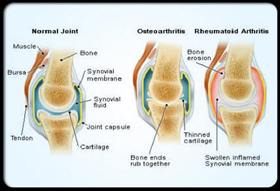
Rheumatoid Arthritis
Common Names:
ArthritisAbout Rheumatoid Arthritis:
Rheumatoid arthritis (RA) is a chronic, systemic inflammatory disorder that may affect many tissues and organs, but principally attacks flexible (synovial) joints. The process produces an inflammatory response of the capsule around the joints (synovium) secondary to swelling (hyperplasia) of synovial cells, excess synovial fluid, and the development of fibrous tissue (pannus) in the synovium. The pathology of the disease process often leads to the destruction of articular cartilage and ankylosis (fusion) of the joints. Rheumatoid arthritis can also produce diffuse inflammation in the lungs, membrane around the heart (pericardium), the membranes of the lung (pleura), and white of the eye (sclera), and also nodular lesions, most common in subcutaneous tissue. Although the cause of rheumatoid arthritis is unknown, autoimmunity plays a pivotal role in both its chronicity and progression, and RA is considered a systemic autoimmune disease.Causes, incidence, and risk factors;
The cause of RA is unknown. It is an autoimmune disease, which means the body's immune system mistakenly attacks healthy tissue.
RA can occur at any age, but is more common in middle age. Women get RA more often than men do. Infection, genes, and hormone changes may be linked to the disease.
There is no known prevention. Proper early treatment can help prevent further joint damage.
RA usually affects joints on both sides of the body equally. Wrists, fingers, knees, feet, and ankles are the most commonly affected.
The disease often begins slowly, usually with only minor joint pain, stiffness, and fatigue.
Joint symptoms may include:
• Morning stiffness, which lasts more than 1 hour, is common. Joints may feel warm, tender, and stiff when not used for an hour.
• Joint pain is often felt on the same joint on both sides of the body.
• Over time, joints may lose their range of motion and may become deformed.
Other symptoms include:
• Chest pain when taking a breath (pleurisy)
• Dry eyes and mouth (Sjogren syndrome)
• Eye burning, itching, and discharge
• Nodules under the skin (usually a sign of more severe disease)
• Numbness, tingling, or burning in the hands and feet
• Sleep difficulties
Rheumatoid arthritis can affect nearly every part of the body. Complications may include:
• Damage to the lung tissue (rheumatoid lung)
• Increased risk of hardening of the arteries
• Spinal injury when the neck bones become damaged
• Inflammation of the blood vessels (rheumatoid vasculitis), which can lead to skin, nerve, heart, and brain problems
• Swelling and inflammation of the outer lining of the heart (pericarditis) and of the heart muscle (myocarditis), which can lead to congestive heart failure
The treatments for RA can also cause serious side effects. Talk to your doctor about the possible side effects of treatment and what to do if they occur.
Frequent Symptoms:
Stiff Joints, Red Joints, Hot to the Touch Joints, Effecting Joints on Both Sides i.e., both ankles, both wrist etc.

Treatment Options:
According to the Mayo Clinic, some common complementary and alternative treatments that have shown promise for rheumatoid arthritis include:
• Plant oils. The seeds of evening primrose, borage and black currant contain a type of fatty acid that may help with rheumatoid arthritis pain and morning stiffness. Side effects may include nausea, diarrhea and gas. Some plant oils can cause liver damage or interfere with medications, so check with your doctor first.
• Fish oil. Some preliminary studies have found that fish oil supplements may reduce rheumatoid arthritis pain and stiffness. Side effects can include nausea, belching and a fishy taste in the mouth. Fish oil can interfere with medications, so check with your doctor first.
• Tai chi. This movement therapy involves gentle exercises and stretches combined with deep breathing. Many people use tai chi to relieve stress in their lives. Small studies have found that tai chi may reduce rheumatoid arthritis pain. When led by a knowledgeable instructor, tai chi is safe. But don’t do any moves that cause pain.






